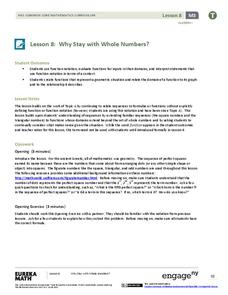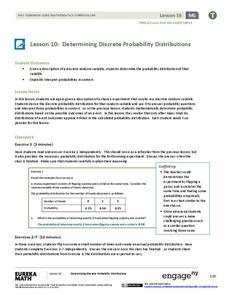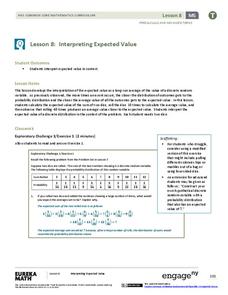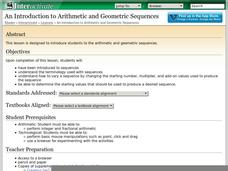EngageNY
Discrete Random Variables
You don't need to be discreet about using the resource on discrete variables. In the fifth installment of a 21-part module, scholars explore random variables and learn to distinguish between discrete and continuous random variables. They...
EngageNY
Probability Distribution of a Discrete Random Variable
Learn how to analyze probability distributions. The sixth installment of a 21-part module teaches pupils to use probability distributions to determine the long-run behavior of a discrete random variable. They create graphs of probability...
EngageNY
Determining Discrete Probability Distributions 1
Learn how to determine a probability distribution. In the ninth installment of a 21-part module, future mathematicians use theoretical probabilities to develop probability distributions for a random variable. They then use these...
EngageNY
Expected Value of a Discrete Random Variable
Discover how to calculate the expected value of a random variable. In the seventh installment of a 21-part module, young mathematicians develop the formula for expected value. They connect this concept the dot product of vectors.
EngageNY
More Examples of Functions
Discrete or not discrete? Individuals learn about the difference between discrete and non-discrete functions in the fourth installment of a 12-part module. They classify some examples of functions as being either discrete or non-discrete.
EngageNY
Why Stay with Whole Numbers?
Domain can be a tricky topic, especially when you relate it to context, but here is a instructional activity that provides concrete examples of discrete situations and those that are continuous. It also addresses where the input values...
EngageNY
Determining Discrete Probability Distributions 2
Investigate how long-run outcomes approach the calculated probability distribution. The 10th installment of a 21-part module continues work on probability distributions from the previous lesson plan. They pool class data to see how...
Balanced Assessment
Melons and Melon Juice
Model the difference between the graphs of discrete and continuous functions. Scholars examine two scenarios and construct graphs to model the situation. They then compare their graphs that illustrate the subtle difference between these...
Curated OER
Probability and Statistics
Students reason mathematically as they solve problems dealing with probability of an even occurring. In this probability lesson, students differentiate between different rankings of candidates running for leadership. They identify...
TryEngineering
Choose Your Best Way
Find the best path through town. The lesson teaches future computer programmers about networks and paths in graph theory. They develop a network of their towns to determine the most efficient path to visit each of their homes.
Boward County Public Schools
Hoot Activities
If you're looking for engaging, cross-curricular, inquiry-based activities and projects to support your class reading of Carl Hiaasen's Hoot, you've come to the right place!
Curated OER
Burger King Investigation
Students study data on the nutritional value of Burger King meals in order to discover its nutritional value and also to compare the meals, using mathematical computation, to the recommended daily diet. In this data handling...
Balanced Assessment
Garages and Phones
Examine and compare a linear and step function. The task provides two scenarios, one modeled by a linear function and the other a step function. Pupils create a graph for each and explain how each compares to the other.
Curated OER
Holly Leaves
Sixth graders analyze mathematics by participating in a botany activity. In this holly lesson, 6th graders identify if all holly leaves have the same amount of prickles by conducting a math survey. Students analyze many leaves and...
EngageNY
Interpreting Expected Value
Investigate expected value as a long-run average. The eighth installment of a 21-part module has scholars rolling pairs of dice to determine the average sum. They find aggregate data by working in groups and interpret expected value as...
EngageNY
Negative Exponents and the Laws of Exponents
Apply the properties of exponents to expressions with negative exponents. The fifth lesson in the series explains the meaning of negative exponents through an exploration of the properties taught in the previous lessons of the...
EngageNY
Definition of Translation and Three Basic Properties
Uncover the properties of translations through this exploratory lesson. Learners apply vectors to describe and verify transformations in the second installment of a series of 18. It provides multiple opportunities to practice this...
Curated OER
NUMB3RS - Season 2 - "Convergence" - Air Hockey
Learn how to use a matrix to organize data to solve a problem. This activity uses wins and losses to rank players for an air hockey tournament they wish to have. After practicing some basic matrix operations the class could do the...
Curated OER
Properties of Matrices
A TI-nspire activity to find determinants of matrices using calculators. The class follows along in this step by step activity to explore operations on matrices. They will mostly be multiplying and at the end of the activity they are...
Curated OER
Get the Picture!
Astronomers practice downloading data from a high-energy satellite and translate the data into colored or shaded pixels. As a hands-on activity, they use pennies to simulate high-energy satellite data and they convert their penny...
Teach Engineering
Discovering Phi: The Golden Ratio
Fe, phi, fo, fum. This activity leads pairs to find the ratio of consecutive terms of the Fibonacci sequence. The pairs find that the Fibonacci sequence can be found in many places. A discussion with the class shows that the ratios...
Curated OER
Graphs and Data
Pupils investigate poverty using graphs. In this algebra lesson, students collect data on the effects of poverty and use different rules to analyze the data. They graph and use the trapezoid rule to interpret the data.
Shodor Education Foundation
An Introduction to Arithmetic and Geometric Sequences
Help your class look for patterns as they create their own arithmetic and geometric sequences. Engage learners with an introductory discussion on sequences and use the applet to let them explore how sequences are formed. Teachers might...
Other popular searches
- Discrete Mathematics Graph
- Discrete Mathematics Grade 5
- History Discrete Mathematics
- Discrete Mathematics Lecture
- Discrete Mathematics Trees
- Discrete Mathematics Grade 8
- Discrete Mathematics Graf
- Discrete Mathematics Graft























